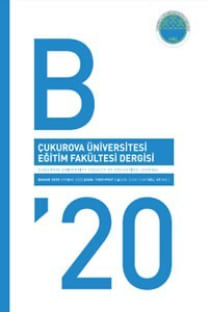THE EFFECT OF MICROTEACHING APPLICATIONS IN ENVIRONMENTAL EDUCATION
Micro-teaching, environmental education, environmental awareness
___
Ak, S. (2008). İlköğretim öğretmen adaylarının çevreye yönelik bilinçlerinin bazı demografik değişkenler açısından incelenmesi. Abant İzzet Baysal Üniversitesi, Yüksek Lisans Tezi: Sosyal Bilimler Enstitüsü.Akalın, S. (2005). Comparison between traditional teaching and microteaching during school experience of student-teachers. Eurasian Journal of Educational Research, 20, 1-13.
Amobi, A.A. (2005). Preservice teachers’ reflectivity on the sequence and consequences of teaching actions in a microteaching experience. Teacher Education Quarterly, 32(1), 115-130.
Brent, R. & Thomson, W.S. (1996). Videotaped microteaching: bridging the gap between the university to the classroom. The Teacher Educator, 31, 238-247.
Büyükkaragöz, S.S. & Çivi, C. (1999). Genel öğretim metotları, öğretimde planlama uygulama (10. Baskı). Beta Basım Yayım Dağıtım, İstanbul.
Çakır, Ö. (2000). Öğretmen yetiştirmede teoriyi pratiğe bağlayan mikroöğretimin Türkiye’deki üç üniversitede durumu. Hacettepe Üniversitesi Eğitim Fakültesi Dergisi, 18, 62-68.
Çakır, Ö., & Aksan, Y. (1992). Yabancı dil öğretmeni yetiştirmede mikroöğretimin rolü: Bir model. Hacettepe Üniversitesi Eğitim Fakültesi Dergisi, 7, 313-320.
Ceyhun, İ. & Karagölge, Z. (2002). Kimya eğitiminde tezsiz yüksek lisans öğrencileri ile mikroöğretim. V. Ulusal Fen Bilimleri ve Matematik Eğitimi Kongresi. ODTÜ Kültür ve Kongre Merkezi. Ankara. 16-18 Eylül.
Cunningham, A. & Benedetto, S. (2002). Using digital video tools to promote reflective practice. Proceedings of Society for Information Technology and Teacher Education International Conference, Nashville, Tennessee, USA.
Erökten, S., & Durkan, N. (2009). Özel Öğretim Yöntemleri II dersinde mikroöğretim uygulamaları. 1. Uluslararası Türkiye Eğitim Araştırmaları Kongresi, 1-3 Mayıs, Çanakkale oc.eab.org.tr/egtconf/pdfkitap/pdf/167.pdf adresinden 15 Nisan 2009 tarihinde alınmıştır.
Fernandez, M. L., & Robinson, M. (2007). Prospective teachers’ perspectives on microteaching lesson study. Education, 127(2), 203–215.
Fernandez, M. L. (2005). Learning through microteaching lesson study in teacher preparation. Action Teacher Education, 26(4), 37-47.
Frederiksen, J. R., White, B. Y., Shimoda, T. A. (1999). Enabling students to construct theories of collaborative inquiry and reflective learning: Computer support for metacognitive development. International Journal of Artificial Intelligence in Education, 10, 151-182.
Gess-Newsome, J., & Lederman, N. G. (1990). The preservice microteaching course and science teachers' instructional decisions: A qualitative analysis. Journal of Research in Science Teaching, 27(8), 717-726.
Görgen, İ. (2003). Mikroöğretim uygulamasının öğretmen adaylarının sınıfta ders anlatımına ilişkin görüşleri üzerine etkisi. Hacettepe Üniversitesi Eğitim Fakültesi Dergisi, 24, 56-63.
Gürses, A., Bayrak, R., Yalçın, M., Açıkyıldız, M., & Doğar, Ç. (2005). Öğretmenlik uygulamalarında mikro öğretim yönteminin etkililiğinin incelenmesi. Kastamonu Eğitim Dergisi, 1 (1) 1-10.
Hawkey, K. (1995). Learning from peers: The experience of student teachers in school-based teacher education. Journal of Teacher Education, 46, 175-183.
Higgins, A., & Nicholl, H. (2003). The experiences of lecturers and students in the use of microteaching as a teaching strategy. Nurse Education in Practice, 3, 220-227.
Karadeniz, Ş. (2009). Mikroöğretim değerlendirme formu. http://www.sirinkaradeniz.com/kaynaklar/ppt/ Egt/ mikroogretim_degerlendirme.doc
Karçkay, T. A., & Sanlı, Ş. (2009). The effect of micro teaching application on the preservice teachers’ teacher competency levels. Procedia Social and Behavioral Sciences, 1, 844–847.
Kavas, G. (2009). Video destekli web tabanlı akran değerlendirme sisteminin mikroöğretim uygulamaları üzerine etkileri: Bilgisayar öğretmenliği adayları örneği. Yüksek lisans tezi. Marmara Üniversitesi Eğitim Bilimleri Enstitüsü, İstanbul.
Kpanja, E. (2001). A study of the effects of video tape recording in microteaching training. British Journal of Educational Technology, 32(4), 483–486.
Kupper, J.B. (2001). The microteaching experience: student perspectives. Education, 121(4), 830-835.
Lee, G. C., & Wu, C.C. (2006). Enhancing the teaching experience of pre-service teachers through the use of videos in web-based computer-mediated communication (CMC). Innovations in Education and Teaching International, 43(4), 369-380.
Overschie, M., Wayenburg, A., Vries, P., & Pujadas, M. (2006). Microteaching: Effective knowledge transfer for sustainable technological innovation. International Conference on Engineering Education in Sustainable Development, EESD.
Pauline, R. F. (1993). Microteaching: An integral part of a science methods class. Journal of Science Teacher Education, 4(1), 9-17.
Peker, M. (2009). Genişletilmiş mikro öğretim yaşantıları hakkında matematik öğretmeni adaylarının görüşleri. Türk Eğitim Bilimleri Dergisi, 7(2), 353-376.
Sherin, M.G. (2000). Viewing teaching on videotape. Educational Leadership, 57 (8), 36-38.
Spurgeon, S. & Bowen, J.L. (2002). Digital video/multimedia portfolios as a tool to develop reflective teacher candidates. 23rd National Educational Computing Conference, Texas.
Subramaniam, K. (2006). Creating a microteaching evaluation form: The needed evaluation criteria. Education, 126(4), 666-667.
Tok, T.N. (2007). Etkili öğretim için yöntem ve teknikler. Öğretim ilke ve yöntemleri, Ahmet Doğanay. Pagem A Yayıncılık, Ankara.
Uzun, N. & Sağlam, N. (2006). Ortaöğretim öğrencileri için çevresel tutum ölçeği geliştirme ve geçerliliği. Hacettepe Üniversitesi Eğitim Fakültesi Dergisi, 30, 240-250.
Wahba, E.H. (1999). Microteaching. English teaching. Forum Online, 37(4).
Wilkinson, G.A. (1996). Enhancing microteaching through additional feedback from preservice administrators. Teaching & Teacher Education, 12(2), 211-221.
- ISSN: 1302-9967
- Yayın Aralığı: 3
- Başlangıç: 2000
- Yayıncı: Çukurova Üniversitesi Matbaası
Motivation and learning strategies as predictors of high school students' math achievement
Devrim Erdem KEKLİK, İbrahim KEKLİK
The problems that primary school teachers' encounter in the first five years in their professions
Gökçe Dervişoğlu KALKAN, Tuncay DİLCİ
Zekavet KABASAKAL, Tarık TOTAN
THE USE OF ICT IN ENGINEERING DEPARTMENTS
THE EFFECT OF MICROTEACHING APPLICATIONS IN ENVIRONMENTAL EDUCATION
Naim UZUN, Özgül KELEŞ, Necdet SAĞLAM
Fatma Burcu TOPU*a; Özlem BAYDAŞa
Fatma TOPU, Özlem BAYDAŞ, Zeynep TURAN, Yüksel GÖKTAŞ
THE ACADEMIC AND VOCATIONAL ENGLISH LANGUAGE NEEDS OF THE SCHOOL OF HEALTH STUDENTS
